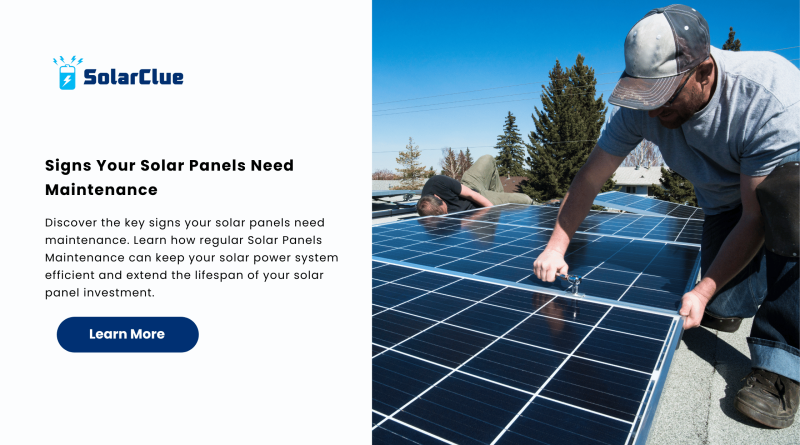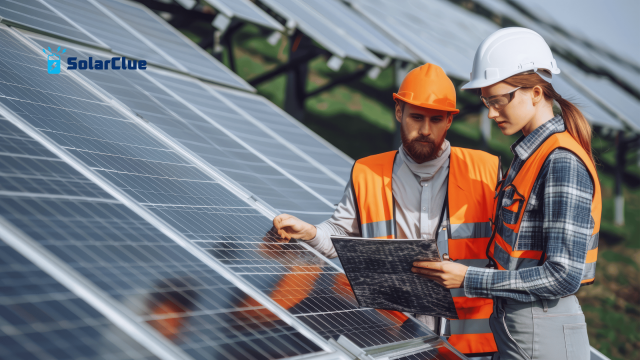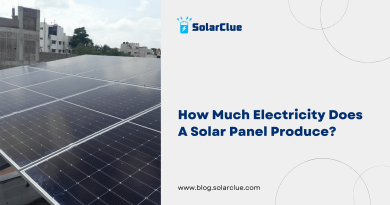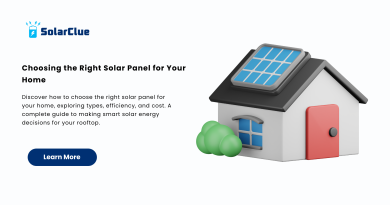Signs Your Solar Panels Need Maintenance
Investing in solar panels is one of the smartest decisions for homeowners and businesses looking to harness solar energy. A properly installed solar power system can deliver clean and cost-effective electricity for 25 years or more. However, like any technology, solar panels require periodic care. Ignoring small issues can lead to efficiency loss, reduced savings, or even system damage. Knowing the signs your solar panels need maintenance ensures that your solar power investment continues to perform at its best.
Table of Contents
- 1 Why Solar Panels Maintenance Matters
- 2 Common Signs Your Solar Panels Need Maintenance
- 2.1 1. Drop in Energy Production
- 2.2 2. Visible Dirt and Debris
- 2.3 3. Physical Damage to Panels
- 2.4 4. Inverter Warning Lights
- 2.5 5. Unexpectedly High Electricity Bills
- 2.6 6. Shading or Obstruction Issues
- 2.7 7. Loose Wiring or Corrosion
- 2.8 8. Hot Spots on Panels
- 2.9 9. Water Leakage
- 2.10 10. Age of the Solar Panels
- 3
- 4 How Often Should You Perform Solar Panels Maintenance?
- 5 Tips for Effective Solar Panels Maintenance
- 6 Professional vs. DIY Solar Panels Maintenance
- 7 Conclusion
- 8 FAQs
Why Solar Panels Maintenance Matters
Solar Panels Maintenance is not just about cleaning dust or dirt. It’s about preserving energy output, ensuring system safety, and maximizing return on investment. A well-maintained solar panel delivers higher performance, avoids unexpected repairs, and extends its operational life. Regular checkups help detect small issues before they escalate into costly problems, keeping your solar power system reliable for years to come.
Common Signs Your Solar Panels Need Maintenance
1. Drop in Energy Production
If you notice your solar energy generation is lower than expected, despite favorable weather, it may indicate your solar panels need attention. Dirt accumulation, shading issues, or malfunctioning components like inverters can cause reduced output. Comparing your energy production data with past months is a good way to detect inefficiency.
2. Visible Dirt and Debris
Dust, leaves, bird droppings, and pollution often accumulate on the surface of a solar panel. While minor dirt may not be a big issue, thick layers can block sunlight and significantly reduce efficiency. If your panels look dirty and washing rain doesn’t clear them, it’s a sign they need professional cleaning.
3. Physical Damage to Panels
Cracks, chips, or scratches on the glass surface of solar panels should never be ignored. Physical damage can reduce efficiency and, in some cases, compromise safety. Storms, falling branches, or hail are common causes. Immediate repair or replacement may be necessary to protect your solar power system.
4. Inverter Warning Lights
Your inverter is the heart of your solar power setup, converting DC power from the panels into usable AC electricity. If your inverter shows red or orange warning lights instead of green, it indicates a malfunction. Inverter problems often go unnoticed until energy production drops drastically.
5. Unexpectedly High Electricity Bills
One of the biggest benefits of a solar power system is reduced electricity bills. If your bills start rising without changes in energy usage, it’s a clear signal your system may not be performing optimally. This could point to inverter failure, panel shading, or connection issues.
6. Shading or Obstruction Issues
Over time, new constructions, growing trees, or nearby objects can cast shade on your solar panels. Even small amounts of shading can reduce energy output significantly. Regular monitoring ensures such obstructions are detected and addressed before they harm long-term performance.
7. Loose Wiring or Corrosion
Cables, connectors, and junction boxes are vital components of your solar power system. Exposure to heat, rain, and dust can cause wear, loose connections, or corrosion. These issues not only affect system efficiency but also pose safety hazards if not addressed quickly.
8. Hot Spots on Panels
If certain areas of a solar panel get hotter than others, it indicates an imbalance or defect. Hot spots can occur due to dirt, shading, or internal cell issues. Over time, these can degrade the panel permanently and must be fixed promptly.
9. Water Leakage
Panels are designed to withstand rain, but poor installation or sealant issues can lead to water ingress. Signs like fogging inside the glass or corrosion around edges mean moisture has entered the system, which can shorten its lifespan.
10. Age of the Solar Panels
Even with the best care, solar panels degrade naturally over time. After 10–15 years, you may notice lower performance compared to new ones. While not always a sign of immediate failure, it’s important to schedule professional inspections as the system ages.
How Often Should You Perform Solar Panels Maintenance?
Most experts recommend inspecting solar panels at least twice a year. Cleaning schedules depend on your location—urban areas with high pollution or regions with frequent dust storms may require quarterly cleaning. Regular monitoring of system data ensures early detection of efficiency drops.
Tips for Effective Solar Panels Maintenance
-
Schedule annual professional inspections
-
Keep track of inverter performance and energy output
-
Clean panels with soft brushes and mild water pressure
-
Trim nearby trees to prevent shading
-
Address small repairs immediately to avoid costly replacements
Professional vs. DIY Solar Panels Maintenance
While homeowners can clean and visually inspect panels, professional servicing is essential for electrical checks and detailed troubleshooting. A certified technician can test wiring, detect inverter errors, and ensure your solar power system complies with safety standards. DIY cleaning is fine for surface dirt, but technical issues should always be left to experts.
Conclusion
Your solar power journey doesn’t end with installation. Paying attention to the signs your solar panels need maintenance ensures that your investment continues to provide clean and affordable solar energy. Regular care keeps your system safe, efficient, and long-lasting. If you notice lower production, visible dirt, warning lights, or rising electricity bills, it’s time to take action. Remember, timely Solar Panels Maintenance protects both performance and savings.
To explore more about maintaining your solar power system and making the most out of your investment, visit solarclue.com and check detailed insights at blog.solarclue.com.
FAQs
Q1: How often should I clean my solar panels?
Most panels should be cleaned every 3–6 months, depending on dust levels and local weather.
Q2: Do dirty solar panels reduce efficiency?
Yes, dirt and debris can block sunlight, reducing energy output by 10–25% in severe cases.
Q3: Can I perform solar panels maintenance myself?
You can handle basic cleaning and visual inspections, but technical checks should be done by professionals.
Q4: What is the average lifespan of solar panels?
Quality panels last 25–30 years, but performance may decline slightly each decade.
Q5: How do I know if my inverter is failing?
Warning lights, unusual noises, or consistent drops in energy production are signs your inverter needs attention.




